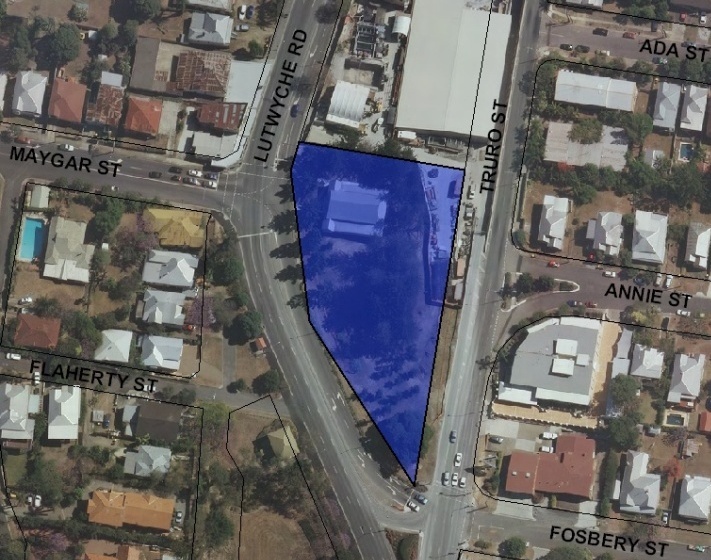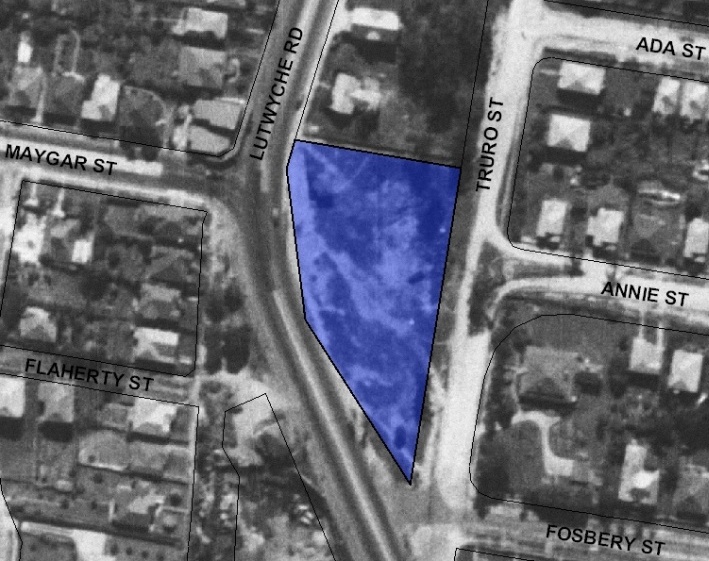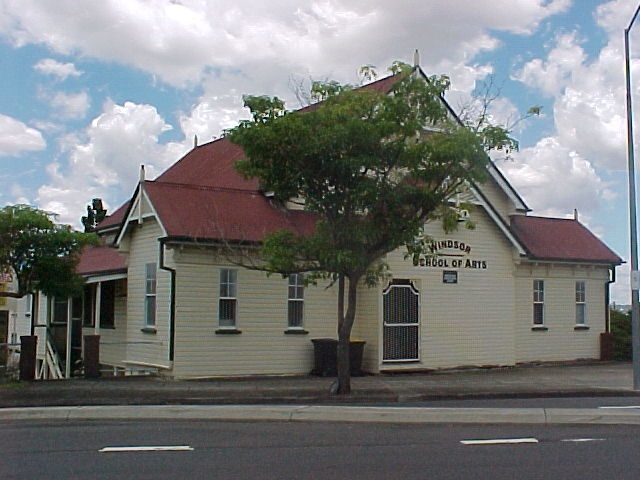Addresses
Type of place
Hall, Library, Park
Period
Federation 1890-1914
Style
Queenslander
Addresses
Type of place
Hall, Library, Park
Period
Federation 1890-1914
Style
Queenslander
Also known as
Historical Restoration and Music Centre
Lot plan
Key dates
Local Heritage Place Since —
Date of Citation —
Construction
Roof: Corrugated iron;Walls: Timber
Criterion for listing
(A) Historical; (A) Historical; (D) Representative; (G) SocialInteractive mapping
Also known as
Historical Restoration and Music Centre
Lot plan
Key dates
Local Heritage Place Since —
Date of Citation —
Construction
Roof: Corrugated iron;Walls: Timber
Criterion for listing
(A) Historical; (A) Historical; (D) Representative; (G) SocialInteractive mapping
History
The Windsor School of Arts, officially opened by the State Governor, Sir William McGregor in 1911, has been a focus for cultural and social activities in the lives of successive generations of local residents for more than 80 years.
The formation of a Committee to work towards the establishment of a School of Arts in the Windsor area preceded the declaration of the shire of Windsor. A public meeting to discuss the establishment of such an institution was first held in 1885. Subscription lists were issued and donations sought and in February 1886, a grant of land was gazetted for School of Arts purposes. It was situated between the police reserve and Stoneleigh Street. As the residents of the area recovered from both the devastation of the floods and the long term economic depression of the 1890s, the spirit of optimism which imbued so much of Edwardian Brisbane prompted the re-awakening of interest in cultural matters. In 1906, two years after the declaration of the Town of Windsor another public meeting was called to consider utilising the money collected many years ago for that purpose to construct a School of Arts. The Government was approached unsuccessfully for either a loan or a grant to erect the building for which plans had been drawn. Fund raising continued and after a very successful fete was held in 1909, government assistance was once again sought for a building which it was believed would be of great benefit to the residents of Windsor. As the submission pointed out >such an institution was sadly needed for educational purposes and to give the young and rising generation a centre where they can meet together and improve their minds and complete the education given by the State Schools. It is also intended to start a library and reading room.
Plans drawn by Mr Mark Taylor were estimated to cost 650. Tenders were called in August 1910. The lowest of the tenders, that of Mr. Plastow 723, was accepted. The building, T- shaped in plan, comprised a large hall and a stage with a gymnasium underneath. A library room and committee room occupied the wings. It was opened debt-free by the Governor on 16 February 1911.
The School of Arts building was extended in 1920 when a verandah was added along the northern side of the building. A verandah was added to the southern side in 1922. In 1930, a new tallowood floor was laid.
The Windsor School of Arts became renowned for its efficient and effective library and in the early years it provided some continuing education classes. The building was also let to a variety of local organisations, clubs and lodges. It was the venue for numerous cultural events such as eisteddfords, plays, concerts and dances and the Annual Show. In times of crisis such as during the war and in the aftermath of natural disasters such as the 1931 floods, the hall met other needs of the local community, as befitted a building held to be one of the symbols of a community’s social and cultural progress. Such was its success in Library services that in 1930, it obtained additional land on which to erect a new public library and reading room. The new Windsor Public Library was completed in 1933. In 1940, the original building was moved further back on site to accommodate the widening of Lutwyche Rd.
The School of Arts movement began in 1802 in Glasgow, where Dr George Birkbeck established the first mechanics’ institute in an effort to improve the education and employment prospects for working class men. Over time, the terms ‘School of Arts’ and ‘mechanics’ institute’ became interchangeable. As the Allom Lovell study points out, during the 1880s and 1890s the School of Arts movement grew rapidly in Queensland and by 1900, there were more than 200 Schools of Art, Mechanics Institutes and reading rooms throughout the colony. The School of Arts building became a significant feature of the fabric of the newly developed towns throughout the colony. Though the role of the movement in Technical Education had been subsumed in Brisbane at least after the passing of the 1908 Technical Education Act, no fewer than 24 School of Arts were established in the city between 1909 and 1930.
One of the key activities of Schools of Arts until the 1940s was the provision of local library services. The Libraries Act of 1943 paved the way for both the state government and local authorities to become more involved. Local authorities were empowered under the Act to assume control of Schools of Art if it was deemed desirable for the general betterment and well-being of the inhabitants of its Area, and in the public interest to do so. From that time Schools of Art throughout the state began to close or to be taken over by local authorities. Windsor, was one of the few committees to continue functioning until the 1980s.
While the Windsor School of Arts building ceased to fulfil a role as Library in the mid thirties, over the intervening 70 years it has continued to meet a great variety of needs within the Windsor community. Several of the groups, such as the Poultry Club, which were formed initially under its auspices continued to meet as the twentieth century drew to a close. The School of Arts Committee ceased to exist in 1986. The following year saw the School of Arts building and its reserve amalgamated with the adjoining block of land, so that both were owned by the Windsor Senior Citizens Association. The former School of Arts building remains one of the several structures within the area which together serve as a focus of local identity.
The hall is currently owned by the Brisbane Excelsior Band who renovated and painted the building in 1992. The hall was reopened by Lord Mayor Jim Soorley on the 4 December 1992.
Statement of significance
Relevant assessment criteria
This is a place of local heritage significance and meets one or more of the local heritage criteria under the Heritage planning scheme policy of the Brisbane City Plan 2014. It is significant because:
References
-
Brisbane City Council Detail Plans
-
John Oxley Library, newspaper clippings
-
Windsor School of Arts: Conservation Study, prepared by Allom Lovell Marquis-Kyle for the Windsor and Districts Historical Association Files
Citation prepared by — Brisbane City Council (page revised June 2022)



